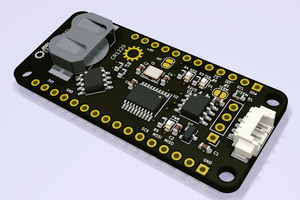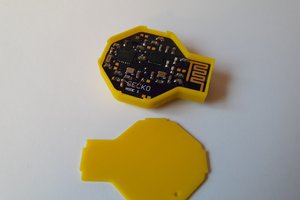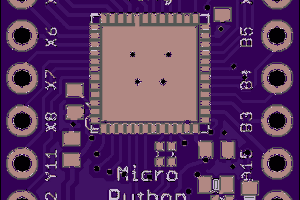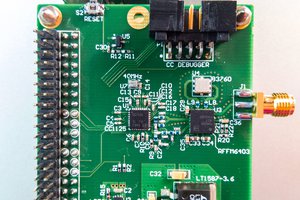Junebug is a development board for chip-scale satellites, or chipsats. These tiny, gram-scale devices must process sensor data in the challenging environment of low-Earth orbit (LEO). Board components must survive the extreme high and low temperatures of space while operating with very little energy harvested from the environment.
To address these challenges, Junebug uses components rated for the extreme temperatures of space. The microcontroller unit (MCU) is an ST ARM Cortex-M4 with an FPU and support for DSP instructions, enabling advanced data processing with machine learning (ML). On-chip Flash (1MB) and 16MB of off-chip Flash provide storage space for state-of-the-art ML models.
Previously-deployed chipsats have identified the challenge of intermittent computing; tiny solar panels only provide enough energy for short bursts of computation. Without proper support for intermittent computing, chipsat programs cannot make forward progress due to frequent reboots. The STM32L496 supports an ultra-low power mode that preserves the contents of 32 backup registers and the RTC, offering a unique solution to the challenge of intermittent computing.
Junebug adheres to the Feather standard, except for one important feature. Since LEO is one of the most adversarial environment for batteries, Junebug omits the JST connector. Junebug is intended for batteryless operation, similar to other PCBs designed for intermittent computing. Instead of battery power, we envision a solar panel Feather Wing with a large capacitor for energy storage (details upon request). We replace the JST connector with pins for programming the MCU.
Junebug is a cutting-edge addition to the Feather ecosystem. It acts as a development board for chipsats - an emerging class of space system. It offers unique support for batteryless, intermittent computing. The FPU, DSP instructions, and storage space allow advanced sensor data processing with ML. Junebug is easy to manufacture, with parts selected to allow hand-assembly.
Future work:
- Currently, Junebug is a two-layer board with two rows of "proto pins." By moving to a four-layer board, these proto pins can be connected to the MCU to support a DCMI camera. Camera data is ideal for ML processing.
- Junebug is meant to be powered by a solar panel Feather Wing with a high-capacity capacitor for energy storage, similar to other batteryless, intermittent PCBs.
- The off-chip Flash can be replaced with an SPI MRAM IC for evaluation of emerging, non-volatile memory technologies.
- Some of the capacitors use the 3216 package, while others use the 1608 package. The 3216 capacitors can be replaced with 1608 capacitors without reducing manufacturability.
- Fixing the solder bridges in the hand-assembled boards!
 Brad Denby
Brad Denby

 John Whittington
John Whittington
 Max.K
Max.K

 Aditya Mukherjee
Aditya Mukherjee
I'm interested in learning more about intermittent computing ... and would love some details on the solar panel/capacitor mentioned.